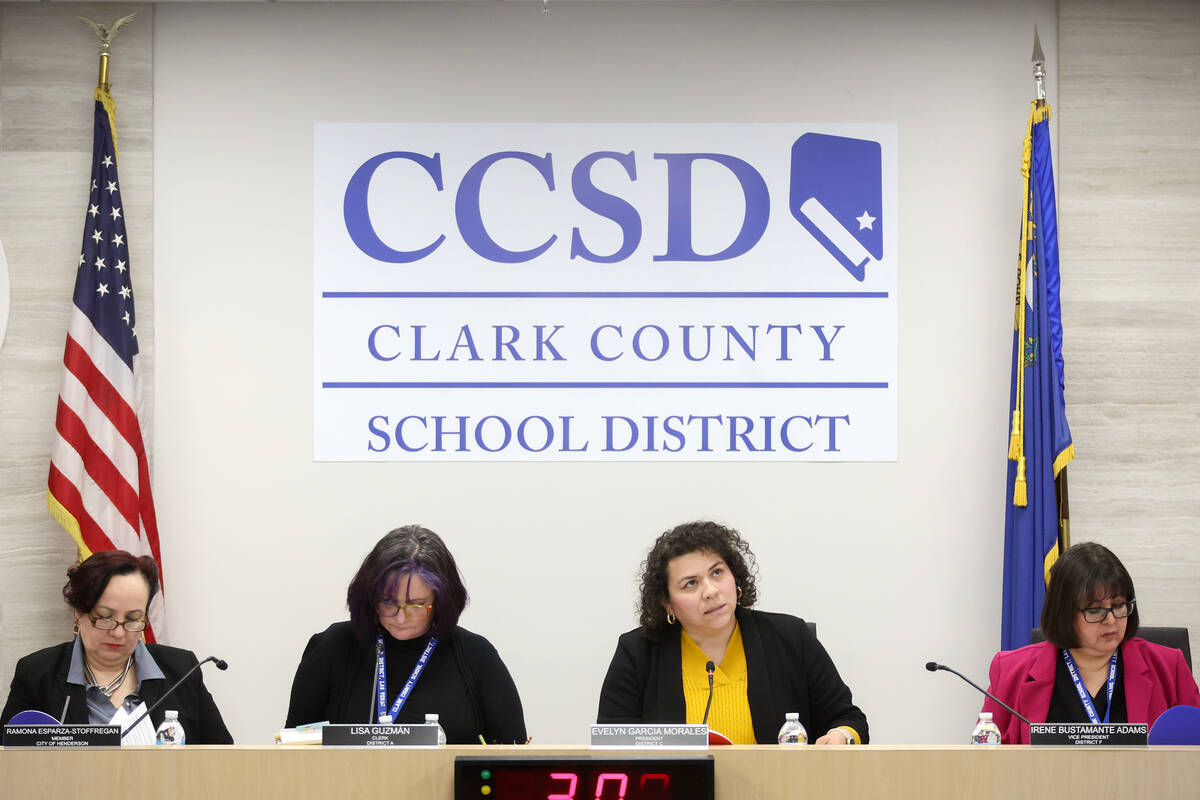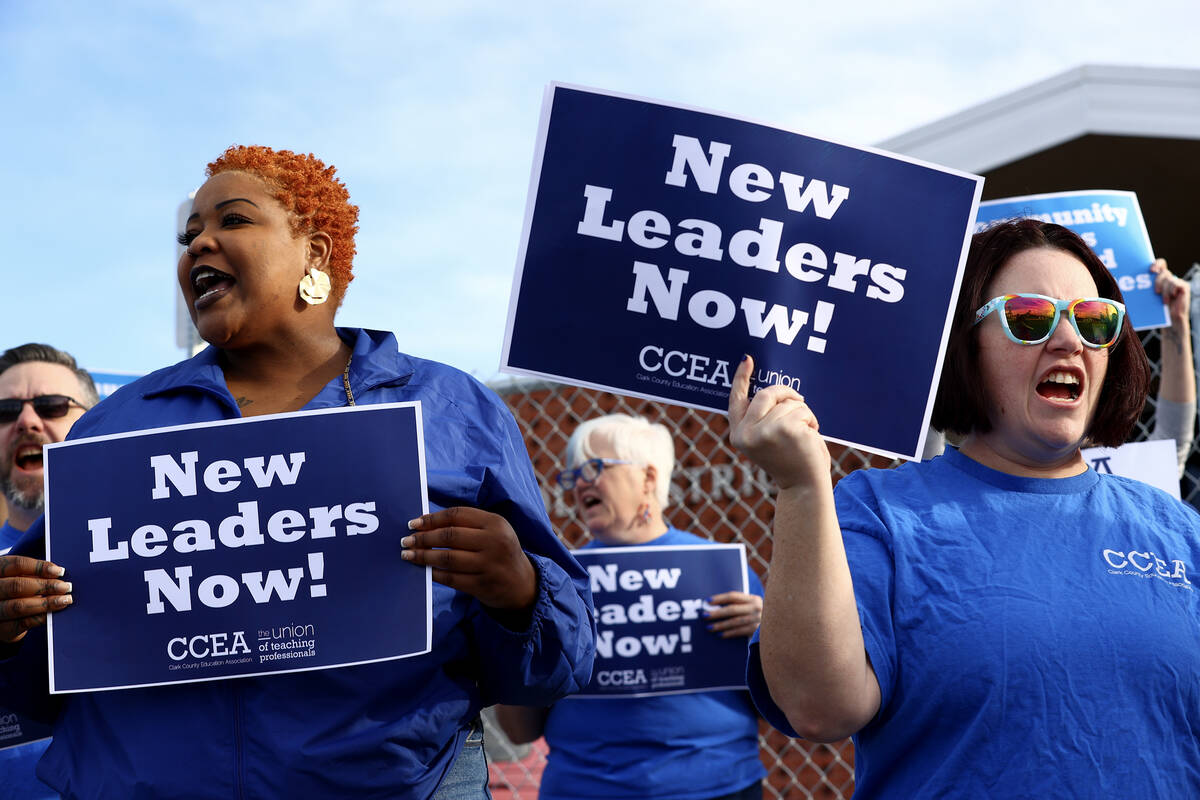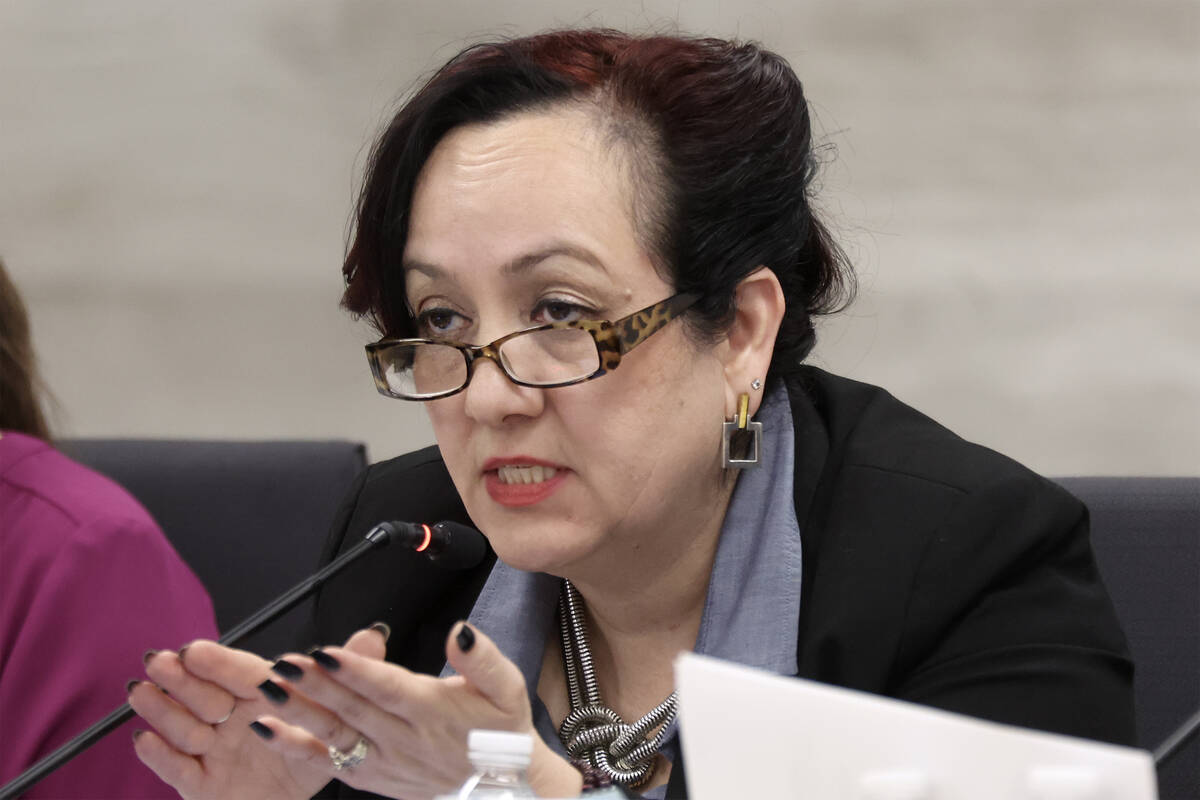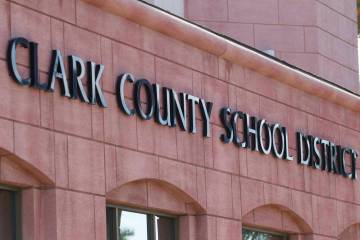CCSD board will pursue search firm for superintendent search
The Clark County School Board voted unanimously Wednesday to move forward with a request for proposals to find a search firm, which would first seek community feedback, to assist with finding a new superintendent.
Jesus Jara announced in late January that he intended to leave his job after serving as the district’s top leader since 2018. His last day was Feb. 23.
On Wednesday, the board heard more than an hour of public comments, most in favor of conducting a nationwide search. Many trustees also said they were leaning that direction.
Hours before the meeting began, 17 organizations issued a joint letter to the School Board calling for a national search for a new superintendent for the nation’s fifth-largest school district.
“As you undoubtedly appreciate, the selection of the next Superintendent will have a major effect on the people we represent and our community at large,” the groups wrote. “In fact, choosing the next Superintendent may be one of the most consequential decisions you will make for years to come.”
The groups wrote they’re requesting a national search that includes local candidates, to build transparency into the process, establish a minimum set of qualifications candidates must meet in order to be considered, and to allow for “robust community participation.”
The organizations that signed the letter are ACLU of Nevada, Andre Agassi Foundation, Clark County Association of School Administrators and Professional-Technical Employees, Clark County Education Association, Council for a Better Nevada, The Engelstad Foundation, Henderson Chamber of Commerce, Las Vegas Asian Chamber of Commerce, Latin Chamber of Commerce, Nevada Community Foundation, Nevada Resort Association, Nevada State AFL-CIO, Retail Association of Nevada, Urban Chamber of Commerce, Vegas Chamber, Windsong Trust and Las Vegas Global Economic Alliance.
Last month, the School Board voted 5-2 to accept Jara’s conditional resignation and a $250,000 payout.
Brenda Larsen-Mitchell, who was previously deputy superintendent, was named interim superintendent.
A national search for a new permanent superintendent could take an estimated three to six months and cost between $60,000 and $100,000, according to meeting materials. A local or state search could take one to two months and cost anywhere from $1,000 to $20,000.
During the meeting, board President Evelyn Garcia Morales and Trustee Lola Brooks shared pros and cons of conducting a nationwide search. And Garcia Morales said she leans toward a local and regional-focused search.
Trustee Katie Williams said that no matter what the board does, not everyone will be happy. She said she’s thinking more neutral in terms of an outside search.
Call for a nationwide search
The Clark County Education Association held a rally Wednesday outside the Greer Education Center, where the School Board meeting was taking place.
The teachers union is calling for a nationwide search for a new superintendent.
About a hour before the meeting, about 30 CCEA members in matching shirts gathered on a public sidewalk outside the education center.
They chanted slogans like, “Community voices … demand new choices” and “What do we want? New leaders. When do we want ’em? Now.” Some cars driving along Flamingo Road honked as they passed.
Matthew Totaro, a high school science teacher, was among the rally participants.
“The last six years under Dr. Jara were a disaster,” he said.
Larsen-Mitchell supported the same policies, Totaro said. If it takes a nationwide search to get the best candidate, that’s what should be done, he said.
Totaro said that he ideally would like to see the next superintendent be someone who knows Southern Nevada and the school district, but who is not from the “old regime.”
Trustee comments
During the meeting, the board heard insights about lessons learned from two trustees — Brooks and Linda Cavazos — who were on the board during the last superintendent search.
Cavazos said she leans toward a national search that’s inclusive of local and state candidates, not eliminating anyone who is eligible.
She said the board needs to be cognizant of search firms and their success rate in terms of how superintendents who’ve been hired are doing.
Cavazos said they also need to go beyond candidates’ resumes. She said she was against on-site visits for candidates in their communities for the last superintendent search, but believes she was wrong.
She said they should have followed up a bit more by talking with people who worked with the candidates about topics such as their managerial style, including how they interact with employees and the community.
The next superintendent may be someone from within the school district and state or someone else, but the board needs to “cast a wide net to see who’s out there,” Cavazos said.
Non-voting trustee Lisa Satory said she feels the district is in a position to use a nationwide search.
The board should decide up front if there’s a desire for an internal or external candidate, and to be honest about what it’s looking for in a superintendent, she said.
Satory also said the superintendent pool is shrinking, so the board needs a firm to get the communication and marketing out to potential candidates.
Trustee Irene Bustamante Adams said there’s a trend to not just look at education-only search firms, but to consider executive search firms.
She said she also wants the community to know that the school board has a focus on community engagement and that piece will be critical.
Bustamante Adams said that Clark County isn’t the same community as in 2017 when the last superintendent search was conducted, noting it’s trying to cultivate industries that aren’t even here yet.
“We are the supply side and we have to meet the demand side,” she said.
Also, if the school board is not in unison with what it’s looking for, that will make it a nightmare for the next superintendent, she said.
Brooks noted the very competitive market for superintendents — a situation that has shifted considerably since the last superintendent search.
And, she said, a longer process will result in a loss of focus on student outcomes.
Brooks also said that a single external candidate will be unlikely to be approved unanimously by the board.
A national search will provide an ample opportunity for school board dysfunction, she said.
Brooks also said there are examples in the school district’s history of local and state searches being successful and up until about 2000, the district had a process to “train up.”
Garcia Morales said the talent pool for superintendents is narrowing.
She also said a downside of a national search is that it would be lengthy. And in order to assess the district’s culture and climate, the district would need a leader who is consistent, she said.
Garcia Morales also said the district’s superintendent salary range is not competitive for experienced superintendents and there was significant community backlash with an increase to superintendent compensation in the past.
Garcia Morales said that if the board is truly focused on student outcomes, she wonders how a national search will impact the ongoing work that needs to take place.
Public comments
During a public comment period, Mary Beth Sewald, president and CEO of the Vegas Chamber, said the superintendent is one of the most important leaders in the state.
Whomever the school board selects for the role should not be predetermined, she said.
Jim Frazee, a high school teacher and vice president of the Clark County Education Association, said that with all due respect to trustees who spoke in favor of a local search — “what nonsense.”
Frazee said some trustees talked about the cost of an extended search. But he noted the board and superintendent have never met a consultant they weren’t willing to spend millions of dollars on.
He said he’d argue that no other school board in the country that would even have the topic under discussion.
A local and state search is a not-so-subtle code for the next person up in the failed Jara administration, Frazee said.
The next superintendent’s most important job is that he or she is in the “people business,” Frazee said, noting they’ll deal with approximately 300,000 students and 40,000 employees.
Having a leader who can deal with people and bring them together is a must, he said.
Reconsidering public comment changes
During the Wednesday meeting, the board also voted 4-3 to deny an appeal request from Cavazos, who wanted an item placed on a future meeting agenda to reconsider the school board’s public comment policy changes.
Cavazos, as well as trustees Lisa Guzman and Brenda Zamora, voted “no.”
Cavazos requested an agenda item in a November email to Garcia Morales, who denied the request, according to online meeting materials.
The item about whether to place the topic on a future meeting agenda was originally scheduled for a Dec. 6 work session, but the meeting was canceled due to the UNLV shooting that occurred the same day.
It was the second attempt to rescind public college changes made in 2022.
Last year, Guzman requested an agenda item to reconsider the decision.
The board deadlocked in a 3-3 vote to change the policy. Since a majority vote was required, it meant the policy remained in effect.
One of the main changes to the policy: There’s only one public comment period on non-agenda items and it’s just before a meeting adjourns. There used to also be a comment period at the beginning of meetings.
Critics argue the change is hindering the ability of people to express concerns and that student voices are no longer being heard.
Currently, attendees have to sit for potentially hours through all of the business items before getting a chance to speak for a few minutes.
Trustees revamped the public comment policy following contentious meetings during the COVID-19 pandemic that included hours of comments. Some speakers yelled at the board or fellow audience members and a handful were escorted out by police.
It was the first time the public comment period had been revised since 2017.
The policy revisions also included meeting decorum rules and outlined the consequences of being removed from a meeting.
During Wednesday’s meeting, a few public commenters were in favor of Cavazos’ appeal and making changes to the public comment policy.
Teacher Tiffanie Bemoll said that under the previous policy, students were able to voice concerns during the first 20 minutes of the meeting, and then go home and do their homework.
She said the board used to regularly hear from students.
Now, students and parents are waiting for hours to speak, and some of them need to be up at 4 a.m. the next day to catch buses, Bemoll said.
“This serves no-one,” she said.
Contact Julie Wootton-Greener at jgreener@reviewjournal.com. Follow @julieswootton on X.































